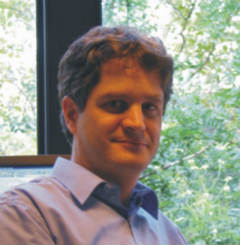Chris Rhomberg

Professor of Sociology (at Rose Hill)
[email protected]
718-817-3861
Fax: 718-817-3846
Dealy Hall 402A
-
B.A. Brandeis University
M.A., Rutgers University
Ph.D., University of California Berkeley, 1998 -
Chris Rhomberg works in the areas of urban and political sociology, race and ethnicity, labor and labor movements, and historical methods. His first book, No There There: Race, Class and Political Community in Oakland (University of California Press, 2004) received the 2006 Robert E. Park Award for best book in urban and community sociology from the American Sociological Association, and his second book, The Broken Table: The Detroit Newspaper Strike and the State of American Labor (Russell Sage, 2012), received the 2013 best book award from the ASA section on Labor and Labor Movements. Among his articles are “A Signal Juncture: The Detroit Newspaper Strike and Post-Accord Labor Relations in the United States” (American Journal of Sociology, Vol. 115, No. 6, May 2010: 1853–94), which received the 2010 Distinguished Scholarly Article Award from the ASA section on Labor and Labor Movements and was co-winner of the 2011 Distinguished Scholarly Contribution Award (Article) from the ASA section on Political Sociology.
His research has centered on issues of race, labor, and urban politics in American political development, and on workplace organization and labor relations in the United States. Methodologically, he is interested in narrative forms of sociological explanation and problems of representing collective agency, topics explored in his article “Class and Collective Action: Writing Stories about Actors and Events,” Sociología Histórica, Vol. 1, No. 3, 2013: 93-116 [also translated as “Clase y Acción Colectiva: Escribir Historias sobre Actores y Eventos,” in the same issue.]
Current projects include a study of the production process in cultural or creative industries, inequalities in urban labor markets and the organization of work, and emerging forms of workers' mobilization for change.
-
Chris Rhomberg. 2012. The Broken Table: The Detroit Newspaper Strike and the State of American Labor. New York: Russell Sage Foundation.
Chris Rhomberg. 2004. No There There: Race, Class and Political Community in Oakland. Berkeley: University of California Press; second printing 2007.
-
Chris Rhomberg, forthcoming. “Before the Storm: Trends in the Organization of Work in the U.S.,” La Nouvelle Revue du Travail (Paris, France).
Chris Rhomberg and Steven Lopez, 2021. “Understanding Strikes in the 21st Century: Perspectives from the USA,” Research in Social Movements, Conflicts and Change, 44 (March 2021): 37-62. https://doi.org/10.1108/S0163-786X20210000044005
Chris Rhomberg, 2020. “The Struggle for a New Labor Regime: The U.S.,” Tempo Social (Sao Paolo, Brazil), 32(1) (January-April 2020): 99-118. https://www.revistas.usp.br/ts/article/view/164863
Jenny Chan, Manjusha Nair, and Chris Rhomberg, 2019. “Precarization and Labor Resistance: Canada, the United States, India and China,” Critical Sociology, 45(4/5): 469-483.
Chris Rhomberg, 2018. “'$15 and a Union': Searching for Workers’ Power in the Fight for $15 Movement,” pp. 251 - 270 in No One Size Fits All: Worker Organization, Policy, and Movement for a New Economic Age, ed. Janice Fine, Linda Burnham, Kati Griffith, Minsun Ji, Victor Narro, and Steven Pitts. Champaign, IL: Labor and Employment Relations Association.
Heather Gautney and Chris Rhomberg, “The Runaway Production Complex? The Film Industry as a Driver of Urban Economic Revitalization in the United States,” City and Community, Vol. 14, No. 3, September 2015: 262-285.
Chris Rhomberg, 2013. “Class and Collective Action: Writing Stories about Actors and Events,” Sociologia Historica, Vol. 1, No. 3, pp 93-116, available at: revistas.um.es/sh/article/view/189251/155991
Chris Rhomberg, 2013. “The Return of Judicial Repression: What Has Happened to the Strike?” The Forum: A Journal of Applied Research in Contemporary Politics, Vol. 10: Iss. 1, Article 1 (2012).
Chris Rhomberg, 2010. “A Signal Juncture: The Detroit Newspaper Strike and Post-Accord Labor Relations in the United States,” American Journal of Sociology 115, no. 6 (May): 1853–94.
Winner, 2010 Distinguished Scholarly Article Award, American Sociological Association section on Labor and Labor Movements Co-winner, 2011 Distinguished Scholarly Contribution Award (Article), American Sociological Association section on Political Sociology
Chris Rhomberg and Louise Simmons. 2005. “Beyond Strike Support: Labor-Community Alliances and Democratic Power in New Haven.” Labor Studies Journal 30, no. 3 (Fall):27-41.
------. 2006. Republished as “Race, Labor, and Urban Community: Negotiating a ‘New Social Contract’ in New Haven.” In Race and Labor Matters in the New U.S. Economy, edited by Manning Marable, Immanuel Ness, and Joseph Wilson. Rowman and Littlefield, Lanham, MD.
Chris Rhomberg. 2005. “Class, Race and Urban Politics: The 1920s Ku Klux Klan Movement in the United States.”Political Power and Social Theory 17:3-34.
Chris Rhomberg. 1998. “White Nativism and Urban Politics: The 1920s Ku Klux Klan in Oakland, California.” Journal of American Ethnic History 17/2:39-55.
Chris Rhomberg. 1995. “Collective Actors and Urban Regimes: Class Formation and the 1946 Oakland General Strike.”Theory and Society 24:567-594.
-
Undergraduate
- Urban Sociology
- Contemporary Issues and Policies: Work, Welfare, and Democracy
- Internship Seminar: Community Organizations
- Mass Media and the News
- Labor Relations in the United States
- Historical Methods in Sociology
- Social Theory and Social Relations
- Class, Race and Urban Politics in the United States
- Work and Family
- Urban Poverty
Graduate
- Comparative Urbanization
- Current Debates in Political Sociology
- Advanced Methods in Historical Research
- Contemporary Racial and Ethnic Formation
- Urban Sociology
- Research Skills in Urban Studies